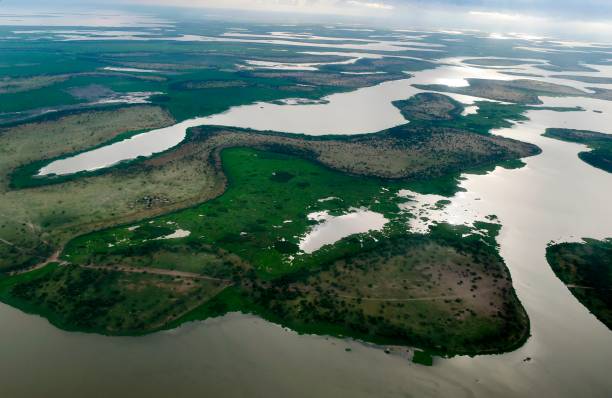The prospects for stabilization, recovery, and resilience in the Lake Chad Basin Region
- Date
- Monday 24 January 2022, 13:00 GMT
- Location
- Zoom
- Zoom recording
- Link to event recording
- Webinar documents
- Download Webinar resources here

This aerial picture taken on July 16, 2016 shows the Lake Chad in the Bol region, around 200km from Chad capital city N'Djamena. (Photo by SIA KAMBOU / AFP) (Photo credit should read SIA KAMBOU/AFP via Getty Images)
It is estimated that more than 30 million people are dependent on the water system of Lake Chad for their livelihoods. Yet the Lake is shrinking caused by a range of human and environmental pressures. The region, which spans the territories of Cameroon, Niger, Nigeria, and Chad, has experienced recent violent conflict from groups affiliated with Boko Haram. The drivers of conflict are multiple and complex, and the region is the focus of layers of effort from local, national, regional and international actors to promote stability and ensure long term recovery and resilience for the affected population.
In light of the above and with the support of the African Union and UNDP, in 2018 the Lake Chad Basin Commission (LCBC) developed a five-year “Regional Strategy for the Stabilization, Recovery & Resilience of the Boko Haram-affected Areas of the Lake Chad Basin (RSS)”. It provides a robust framework for addressing these complex and urgent challenges and recognises the need for a comprehensive, multi-sectoral and coordinated set of local, national, and cross-border efforts. At the heart of its strategic approach is the recognition of the nexus between security, Humanitarian, Development and Peace (HDP) issues and calls for a “New Way of Working” based on “a whole of society approach" to be at the heart of the response to the Lake Chad Basin crisis. Validated by the Lake Chad Basin Commission (LCBC) Council of Ministers in August 2018 and endorsed by the African Union (AU) in December 2018, the Strategy has nine (9) pillars of intervention and forty (40) strategic objectives and is recognised as the overarching strategic framework for addressing the crises in the region.
The webinar which is convened by the Centre for Global Development and Centre for Global Security Challenges of the University of Leeds has the following objectives:
- Provide an overview of the current context and dynamics in the region
- Stimulate discussion on the various interventions led by the Lake Chad Basin Commission within the framework of the RSS
Speakers
- H.E Mamman Nuhu (Amb) (Executive Secretary- Lake Chad Basin Commission) : "Overview of the LCBC RSS, Scope of interventions"
- Dr Chika Charles Aniekwe (Senior Advisor & Head of Stabilisation, UNDP/Lake Chad Basin Commission): "Practicalities and Peculiarities of Civil-Military-Humanitarian Engagement in the LCB region"
- Dr Pedi Obani (Assistant Professor, School of Law, University of Bradford, p.obani@bradford.ac.uk): "Legal and institutional frameworks for water resources governance in the Lake Chad Basin Region"
- Dr Uche Okpara, (UK Research and Innovation Future Leaders Fellow at the Natural Resources Institute, University of Greenwich, U.T.Okpara@greenwich.ac.uk): "Complex relationships between climate change, violent conflict, and fragility in the Lake Chad Basin Region"
Chair: Professor Edward Newman, School of Politics & International Studies, University of Leeds
Reading materials and Documents
- Access all documents on the RSS here
- Civil-Military and Humanitarian Collaboration Dilemmas in the Lake Chad Basin. https://www.africa.undp.org/content/rba/en/home/library/reports/civil-military-and-humanitarian-collaboration-dilemmas-in-the-la.html
- Building climate resilience and hope in West and Central Africa - https://www.undp.org/blog/building-climate-resilience-and-hope-west-and-central-africa
- Civil Society and Stabilization in the Lake Chad Region - https://www.accord.org.za/analysis/civil-society-and-stabilization-in-the-lake-chad-region/
- Local ownership is key to long-term recovery and resilience in the Lake Chad Basin - https://www.accord.org.za/conflict-resilience/covid-19-conflict-resilience-monitor-30-september-2021/
- Boko Haram desertions could be the tipping point-https://issafrica.org/iss-today/boko-haram-desertions-could-be-the-tipping-point
- Islamic State’s determined expansion into Lake Chad Basin - https://issafrica.org/iss-today/islamic-states-determined-expansion-into-lake-chad-basin
- ISWAP takes aim at the State in Cameroon - https://issafrica.org/iss-today/iswap-takes-aim-at-the-state-in-cameroon
